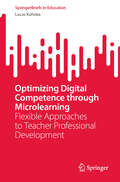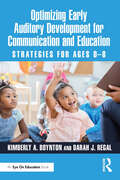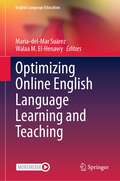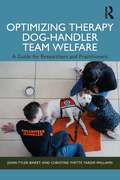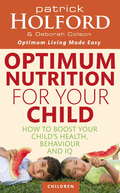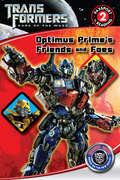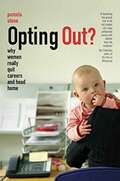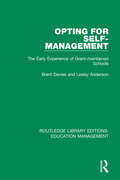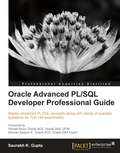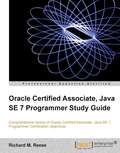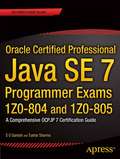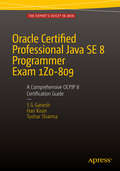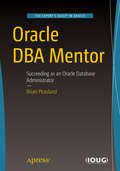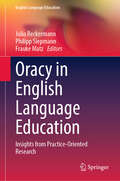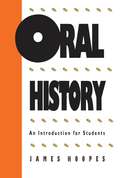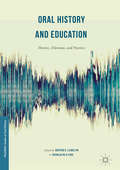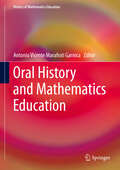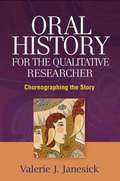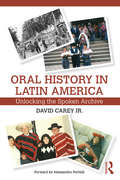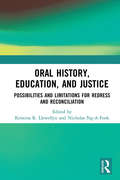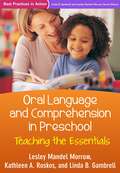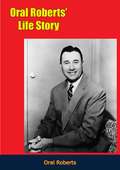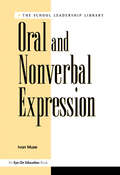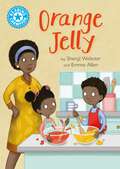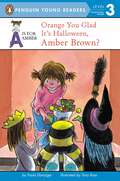- Table View
- List View
Optimizing Digital Competence through Microlearning: Flexible Approaches to Teacher Professional Development (SpringerBriefs in Education)
by Lucas KohnkeThis book examines teacher professional development (TPD) models to integrate microlearning into TPD training and serves as a concise but comprehensive introduction to the field. This book covers critical teacher professional development and microlearning aspects, including artificial intelligence, virtual reality, augmented reality, and mixed modalities. It is an important starting point for teachers, teacher-trainers, academics, and researchers interested in the principles and practices in teacher professional development through microlearning.
Optimizing Early Auditory Development for Communication and Education: Strategies for Ages 0–8
by Kimberly A. Boynton Darah J. RegalThis important resource offers teachers, parents, and medical professionals developmentally appropriate, easy-to-implement activities for developing and supporting a strong auditory foundation in young children, helping increase the depth and stability of children’s auditory skills for future communication, language, and literacy learning opportunities. The book addresses specific areas of auditory processing – like decoding, organization, and prosodic – by defining the area and then providing strategies that can be integrated into any early childhood curriculum, home, and classroom environments. Comprehensive in scope, the book explores brain development specific to auditory processing and language and explains the connections between various aspects of auditory processing and its broader implications, including literacy. Addressing existing developmental gaps, this book is important reading for any early childhood educator and parents, as well as occupational therapists, speech-language pathologists, audiologists, pediatricians, educators and administrators, and school psychologists.
Optimizing Online English Language Learning and Teaching (English Language Education #31)
by Maria-del-Mar Suárez Walaa M. El-HenawyThis book focuses on English as a Foreign Language (EFL) and provides advice on how to approach EFL teaching in the online context. Coronavirus has accelerated e-learning significantly and has highlighted the need of appropriate web tools that will allow teachers to present their material either synchronously or asynchronously, while also adequately assess their students. At the same time, there is a need of tools that can engage the students and motivate them to actively participate in the lesson. With e-learning being a rather new challenge for both teachers and students, this book provides research- and practice- based chapters with strategies, techniques, approaches, and methods which have proven to be successful in e-learning environments, maximizing their impact . Apart from presenting research results with strong pedagogical implications on online or blended English language learning and teaching, the book also trains educators on utilizing online tools and managing online learning environments and platforms.
Optimizing Therapy Dog-Handler Team Welfare: A Guide for Researchers and Practitioners
by John-Tyler Binfet Christine Yvette Tardif-WilliamsInformed by research and grounded in critical discussions of theory and practice, Optimizing Therapy Dog-Handler Team Welfare challenges readers to explore the complexities inherent in, and arising from, practices that optimize welfare for therapy dog-handler teams.Each chapter begins with a case study that elucidates the complexities of canine-assisted interventions and invites readers to consider welfare from multiple perspectives. This book positions welfare as a factor impacting both the therapy dog and the handler, considering the dog handler as a cohesive team.Researchers, educators, and practitioners from across disciplines will find this book both scientifically savvy and practical.
Optimum Nutrition For Your Child: How to boost your child's health, behaviour and IQ
by Patrick Holford BSc, DipION, FBA Optimum Nutritio Deborah ColsonPatrick Holford illustrated the connection between nutrition and all aspects of health in his best-selling book THE OPTIMUM NUTRITION BIBLE. In OPTIMUM NUTRITION FOR YOUR CHILD, he reveals how crucial optimum nutrition is for children's general health and development, as well as their behaviour and IQ. He explains why certain foods are so beneficial and why others are damaging, and enables you to identify common problems in children which can be improved or solved with the right foods and supplements. With invaluable advice on getting children to eat healthy food, food plans and practical tips, this book is the definitive guide for parents.
Optimus Prime's Friends and Foes (Transformers )
by Katharine TurnerIn this Level 2 reader based on Transformers: Dark of The Moon, Optimus Prime is on a quest for peace, but the Decepticons have other plans. Can Optimus Prime and his friends defeat their robot foes? © Hasbro
Opting Out?: Why Women Really Quit Careers And Head Home
by Pamela StoneNoting a phenomenon that might seem to recall a previous era, The New York Times Magazine recently portrayed women who leave their careers in order to become full-time mothers as “opting out.” But, are high-achieving professional women really choosing to abandon their careers in order to return home? This provocative study is the first to tackle this issue from the perspective of the women themselves. Based on a series of candid, in-depth interviews with women who returned home after working as doctors, lawyers, bankers, scientists, and other professions, Pamela Stone explores the role that their husbands, children, and coworkers play in their decision; how women’s efforts to construct new lives and new identities unfold once they are home; and where their aspirations and plans for the future lie. What we learn―contrary to many media perceptions―is that these high-flying women are not opting out but are instead being pushed out of the workplace. Drawing on their experiences, Stone outlines concrete ideas for redesigning workplaces to make it easier for women―and men―to attain their goal of living rewarding lives that combine both families and careers.
Opting for Self-management: The Early Experience of Grant-maintained Schools (Routledge Library Editions: Education Management #6)
by Brent Davies Lesley AndersonOriginally published in 1991. This book examines the early experiences of the first grant-maintained Schools and considers the challenges facing the self-managing school in the 1990s. The book looks at the context of the change of status, what it means to be grant-maintained, and reviews the types of schools that have opted out so far and their reasons for doing so. A section of specially commissioned case studies written by headteachers offers accounts of how each school has coped with the move to grant-maintained status. The book provides a practical and realistic appraisal of grant-maintained schools and their move towards self-management, exploring both the advantages and the disadvantages of opting out of local authority control.
Oracle Advanced PL/SQL Developer Professional Guide
by Saurabh K. GuptaThis book is packed with real world examples that cover all the advanced features of PL/SQL. In turn, each major certification topic is covered in a separate chapter that makes understanding concepts easier. At the end of each chapter, you will find plenty of practice questions to strengthen and test your learning.If you are a PL/SQL developer looking for deeper insight and a move from mid-level programmer to professional database developer, then this is the best guide for you. This book is also an ideal guide for all the Associate level PL/SQL programmers who are preparing for the Professional 1Z0-146 certification. This book assumes you have prior knowledge of PL/SQL programming.
Oracle Certified Associate, Java SE 7 Programmer Study Guide
by Richard M. ReeseEach objective is addressed using a series of programming examples. When the topic impacts memory, stack and heap illustrations are used to provide the reader with a more in depth understanding of the topic. At the end of each chapter, a series of sample questions are provided to reinforce your knowledge. This book is designed to help you prepare for the Oracle Certified Associate, Java SE 7 Programmer Certification exam (1Z0-803) and gain confidence in your understanding and use of Java. Basic knowledge of Java programming is expected.
Oracle Certified Professional Java SE 7 Programmer Exams 1Z0-804 and 1Z0-805
by S G Ganesh Tushar SharmaOracle Certified Professional Java SE 7 Programmer Exams 1Z0-804 and 1Z0-805 is a concise, comprehensive, step-by-step, and one-stop guide for the Oracle Certified Professional Java SE 7 Programmer Exam. The first two chapters set the stage for exam preparation and let the reader get started quickly. The first chapter answers frequently asked questions about the OCPJP exam. This book assumes that the reader is already familiar with Java fundamentals which is in line with the prerequisite of having a OCAJP certification. The book sports considerable supportive material to help the reader in effective exam preparation in the form of appendices: 2 mock tests to give the reader a sense of a real-exam. An instant refresher summarizing the most important concepts (with tips on answering questions) to revise just before the exam. This book will be a delectable read for any OCPJP aspirant because of its simple language, example driven approach, and easy-to-read style. Further, given its 100% focus on the exam and helpful supportive material, this book is clearly an attractive buy to OCPJP aspirants worldwide. What you'll learn In-depth coverage of all 13 exam topics for the certification. The book covers programming concepts succinctly with numerous illustrative programming and real-world examples. These examples will help the reader quickly internalize the discussed concepts. The reader will clearly understand the scope and objectives of the exam, the technical topics covered in the exam, and type and level-of-difficulty of the exam questions. With this, the reader will clearly know what's exactly required for passing the exam. Review questions tune the reader to an "exam mindset". By making mistakes and reading the detailed explanations for the answers, the reader will be better prepared for getting certified. Attempting the practice questions and mock test will help the reader gain necessary confidence to clear the exam. Who this book is for This book is targeted primarily at students and programmers who want to crack the OCPJP exam. Trainers and teachers can use this book as training material for OCPJP exam preparation. This book is also useful to readers who want to refresh their knowledge in Java programming or gain better understanding on using various Java APIs. Table of Contents 1. The OCPJP 7 Exam: Frequently Asked Questions (FAQ) 2. Pretest 3. Java Class Design 4. Advanced Class Design 5. Object-Oriented Design Principles 6. Generics and Collection 7. String Processing 8. Java I/O Fundamentals 9. Java File I/O (NIO. 2) 10. Building Database Applications with JDBC 11. Exceptions and Assertions 12. Localization 13. Threads 14. Concurrency 15. OCPJP 7 Quick Refresher 16. Appendix A: Exam Topics 17. Appendix B: Mock Exam 1 18. Appendix C: Mock Exam 2
Oracle Certified Professional Java SE 8 Programmer Exam 1Z0-809
by S G Ganesh Hari Kiran Tushar SharmaThis book offers a comprehensive guide for the Oracle Certified Professional Java SE 8 Programmer Exam. It starts by answering frequently asked exam questions followed by full coverage of exam topics with numerous programming and real-world examples. Each chapter ends with practice exam questions and a quick summary that reviews key concepts covered in the chapter from the OCPJP exam perspective. The book ends with a full-length, mock exam to ensure you have enough practice before actually taking the exam. If you are an OCPJP 8 exam aspirant, this book is certainly for you. The book assumes you''re already familiar with Java fundamentals, which is in keeping with the prerequisite for having a OCAJP 8 certification. You''ll enjoy reading Oracle Certified Professional Java SE 8 Programmer Exam 1Z0-809 because of its clear, simple language; example driven approach; easy-to-read style; and complete focus on the exam requirements. A few of the key features of the book include: In-depth and 100% coverage of all 12 exam topics for the certification Numerous illustrative programming and real-world examples Hundreds of practice exam questions (including a full-length mock exam) What you''ll learn * Have the necessary knowledge to clear the exam since 100% of the exam topics are covered to the required depth * Clearly understand the scope and objectives of the exam, the technical topics covered in the exam, and type and level-of-difficulty of the exam questions (in short, you will clearly know what''s exactly required for passing the exam) * Get into an "exam mindset" by trying out hundreds of practice exam questions. Who this book is for This book is targeted primarily at developers who want to crack the OCPJP 8 exam. Trainers and teachers can use this book as training material for OCPJP 8 exam preparation. This book is also useful to readers who want to refresh their knowledge in Java programming or gain better understanding on using various Java APIs. Table of Contents Table of Contents The OCPJP 8 Exam: Frequently Asked Questions (FAQ) 1. 1. Oracle Java Certifications: Overview 1. 2. The OCPJP 8 Exam 1. 3. Taking the OCPJP 8 Exam Java Class Design 2. 1. Implement encapsulation 2. 2. Implement inheritance including visibility modifiers and composition 2. 3. Implement polymorphism 2. 4. Override methods from Object class 2. 5. Create and use singleton classes and immutable classes 2. 6. Develop code that uses static keyword Advanced Java Class Design 3. 1. Develop code that uses abstract classes and methods 3. 2. Develop code that uses final keyword 3. 3. Create inner classes 3. 4. Use enumerated types 3. 5. Develop code that uses interfaces and use the atOverride annotation 3. 6. Create and use Lambda expressions Generics and Collections 4. 1. Create and use a generic class 4. 2. Create and use ArrayList, TreeSet, TreeMap, and ArrayDeque objects 4. 3. Use java. util. Comparator and java. lang. Comparable interfaces 4. 4. Collections Streams and Filters 4. 5. Iterate using forEach methods of Streams and List 4. 6. Describe Stream interface and Stream pipeline 4. 7. Filter a collection by using lambda expressions 4. 8. Use method references with Streams Lambda Built-in Functional Interfaces 5. 1. Use the built-in interfaces included in the java. util. function package 5. 2. Develop code that uses primitive versions of functional interfaces 5. 3. Develop code that uses binary versions of functional interfaces 5. 4. Develop code that uses the UnaryOperator interface Java Stream API 6. 1. Develop code to extract data from an object 6. 2. Search for data by using search methods of the Stream classes 6. 3. Develop code that uses the Optional class 6. 4. Develop code that uses Stream data methods and calculation methods 6. 5. Sort a collection using Stream API 6. 6. Save results to a collection using the collect method and use Collectors class 6. 7. Use of merge() and flatMap() methods of the Stream API Exceptions and Assertions 7. 1. Use try-catch and throw statemen...
Oracle DBA Mentor: Succeeding as an Oracle Database Administrator
by Brian PeaslandNew Oracle database administrators can get off the ground running. This book helps you develop the ability to think on your feet and move focus in an instant from arcane syntax details to broad, corporate issues. Along the way, you will see how to create your first database and implement best practices to ensure a well-running database system.What makes Oracle DBA Mentor different is that it also teaches you how to obtain answers that are not found in this or other books. Focus is given to creating a test bed and running test cases to examine hypotheses and prove out solutions so you can be sure they work in production. Attention is given to navigating product documentation and networking in forums and social media to build your skills and a network to draw on when solving problems under pressure. There are chapters of step-by-step technical content as well as coverage of essential skills to succeed as a DBA no matter which database engine you administer.By the time you are done reading this book, you will have confidence to face many of the situations thrown in your direction. You will know where to go for the answers you don’t yet know that you need. You’ll be able to work and troubleshoot under pressure. You’ll know how to create a database, institute backup and recovery procedures, secure the database and its valuable corporate data, and acquire more knowledge as needed so you can run a database to meet the needs of your organization. What You'll LearnInstall Oracle Database with best practicesImplement backup and recovery proceduresUnderstand the fundamentals of databases and data securityFind answers to technical problems using Oracle documentation, Oracle Support, and other resourcesPatch and upgrade an Oracle databaseWho This Book Is ForThe novice database administrator who wants help getting off the ground with their DBA career, and in building the skills to let that career flourish in the long term. Mid-level DBAs will also find the book helpful as they try to grow their career to the next level. While the book is geared toward the Oracle platform, database administrators from other platforms can benefit from the soft skills covered in this book.
Oracy in English Language Education: Insights from Practice-Oriented Research (English Language Education #36)
by Julia Reckermann Philipp Siepmann Frauke MatzThis book innovatively connects the two fields of oracy and practice-oriented empirical research in English language education. It creates synergies and proposes innovative approaches to the study of oracy in the context of learning and teaching English as a second, additional or foreign language. The book also develops a contemporary and holistic concept of oracy, thus contributing to the theoretical discourse in this area of research. The first part provides a general framework of different approaches to conducting practice-oriented research in English language teaching. It introduces the concept of oracy and discusses its relevance to language teaching. Design-based research and action research are outlined as two practice-oriented research approaches. The second part presents research on how oracy can be fostered and assessed at primary and secondary levels, while the third part focuses on tertiary education. The contributions to this book highlight the opportunities and challenges of conducting research in, on, and for classroom practice with stakeholders such as teachers, students, teacher trainees, university students, parents, and school administrators. They explore selected teaching methods, assessment and, finally, teacher education. The theoretical, methodological, and practical challenges of research-practice partnerships are also addressed. This book demonstrates that innovative approaches to the development and assessment of oral skills can be developed through close collaboration between different stakeholders in language education. It serves as an inspiration for other educators and researchers in the field of English language education at all levels.
Oral History
by James HoopesA manual addressed to students rather than to teachers or researchers, Oral History: An Introduction for Students is unique among the "how to" books in the field, adapting some of the best methods of group oral history projects to the needs of individual students. Useful in courses devoted entirely to oral history, the book also addresses the wider audience of students who may choose to do oral research in the context of otherwise traditional courses. The emphasis is on humanistic, imagininative, and intellectual challenge for students in integrating oral accounts with written documents. Only by achieving such flexibility, argues the author, can oral history fully realize its potential as a learning and teaching technique.A signficant contribution to theory and methodology as well as an introductory manual, this book will be of interest to professional oral history researchers and those individual scholars interested in adding oral history to their research techniques. James Hoopes has explored the writings of sociology and communications specialists in order to present a richly detailed and helpful analysis of the interview situation from a transactional point of view. Of particular interest is the section of the book devoted to the ways in which oral history can be related to other areas of research such as biography and family history and to the broader fields of cultural and social history.Hoopes' s central theme is that oral history, whether viewed primarily as a learning or research technique, can fulfill its promise as an important and humanistic resource only if it becomes part of general historical study wherever it is applicable.
Oral History and Education
by Kristina R. Llewellyn Nicholas Ng-A-FookThis book considers if and how oral history is 'best practice' for education. International scholars, practitioners, and teachers consider conceptual approaches, methodological limitations, and pedagogical possibilities of oral history education. These experts ask if and how oral history enables students to democratize history; provides students with a lens for understanding nation-states' development; and supports historical thinking skills in the classrooms. This book provides the first comprehensive assessment of oral history education - inclusive of oral tradition, digital storytelling, family histories, and testimony - within the context of 21st century schooling. By addressing the significance of oral history for education, this book seeks to expand education's capacity for teaching and learning about the past.
Oral History and Mathematics Education (History of Mathematics Education)
by Antonio Vicente Marafioti GarnicaThis book presents an innovative method to investigate the history of mathematics education using oral narratives to study different aspects related to the teaching and learning of mathematics. The application of oral history in mathematics education research was first developed as a method in Brazil in the early 2000s as a result of interdisciplinary dialogues between mathematics educators, anthropologists, sociologists, historians, psychologists, artists and philosophers. Since then, this new methodology has attracted the attention of a growing number of researchers. This contributed volume is the first book in English to bring together chapters written by different members of the research group who developed the methodology and to present a comprehensive overview of the theoretical and practical aspects of the use of oral narratives in the study of experiences in mathematics classrooms. Oral History and Mathematics Education will be a useful tool to researchers and educators looking for new methods to study the dynamics of teaching and learning mathematics in the classroom and to develop innovative mathematics teacher education programs. The volume will also be of interest to historians of education since it describes the foundations of both concepts and procedures related to the application of oral history in educational research, always giving examples of studies already conducted and, whenever possible, suggesting possible research exercises.
Oral History for the Qualitative Researcher
by Ruthellen Josselson Valerie JanesickOral history is a particularly useful way to capture ordinary people's lived experiences. This innovative book introduces the full array of oral history research methods and invites students and qualitative researchers to try them out in their own work. Using choreography as an organizing metaphor, the author presents creative strategies for collecting, representing, analyzing, and interpreting oral history data. Instructive exercises and activities help readers develop specific skills, such as nonparticipant observation, interviewing, and writing, with a special section on creating found data poems from interview transcripts. Also covered are uses of journals, court transcripts, and other documents; Internet resources, such as social networking sites; and photography and video. Emphasizing a social justice perspective, the book includes excerpts of oral histories from 9/11 and Hurricane Katrina, among other detailed case examples.
Oral History in Latin America: Unlocking the Spoken Archive
by David Carey JrThis field guide to oral history in Latin America addresses methodological, ethical, and interpretive issues arising from the region’s unique milieu. With careful consideration of the challenges of working in Latin America – including those of language, culture, performance, translation, and political instability – David Carey Jr. provides guidance for those conducting oral history research in the postcolonial world. In regions such as Latin America, where nations that have been subjected to violent colonial and neocolonial forces continue to strive for just and peaceful societies, decolonizing research and analysis is imperative. Carey deploys case studies and examples in ways that will resonate with anyone who is interested in oral history.
Oral History, Education, and Justice: Possibilities and Limitations for Redress and Reconciliation
by Nicholas Ng-A-Fook Kristina LlewellynThis book addresses oral history as a form of education for redress and reconciliation. It provides scholarship that troubles both the possibilities and limitations of oral history in relation to the pedagogical and curricular redress of historical harms. Contributing authors compel the reader to question what oral history calls them to do, as citizens, activists, teachers, or historians, in moving towards just relations. Highlighting the link between justice and public education through oral history, chapters explore how oral histories question pedagogical and curricular harms, and how they shed light on what is excluded or made invisible in public education. The authors speak to oral history as a hopeful and important pedagogy for addressing difficult knowledge, exploring significant questions such as: how do community-based oral history projects affect historical memory of the public? What do we learn from oral history in government systems of justice versus in the political struggles of non-governmental organizations? What is the burden of collective remembering and how does oral history implicate people in the past? How are oral histories about difficult knowledge represented in curriculum, from digital storytelling and literature to environmental and treaty education? This book presents oral history as as a form of education that can facilitate redress and reconciliation in the face of challenges, and bring about an awareness of historical knowledge to support action that addresses legacies of harm. Furthering the field on oral history and education, this work will appeal to academics, researchers and postgraduate students in the fields of social justice education, oral history, Indigenous education, curriculum studies, history of education, and social studies education.
Oral Language and Comprehension in Preschool
by Lesley Mandel Morrow Linda B. Gambrell Kathleen A. RoskosBefore children are readers and writers, they are speakers and listeners. This book provides creative, hands-on strategies for developing preschoolers' speaking, listening, and oral comprehension skills, within a literacy-rich classroom environment. Each chapter features helpful classroom vignettes; a section called Preschool in Practice, with step-by-step lesson ideas; and Ideas for Discussion, Reflection, and Action. The book addresses the needs of English language learners and describes ways to support students' literacy development at home. The final chapter pulls it all together through a portrait of an exemplary day of preschool teaching and learning. Reproducible forms and checklists can be downloaded and printed in a convenient 8 1/2" x 11" size.
Oral Roberts’ Life Story
by Oral RobertsFirst published in 1952, this is the autobiography of Oral Roberts, founder and chancellor of the Oral Roberts University in Tulsa, Oklahoma, and recognized as one of the outstanding personalities of his generation. He was the author of more than one hundred books and founder of the Oral Roberts Evangelistic Association, which sponsors weekly and daily television programs.“This story will touch the heart strings of every reader. Once you have begun it you will have to finish it. It won’t let you alone. It will tug at your heart for many days to come. I envy you for I would like to have again the chance of reading it for the first time.”—Lee Braxton, Mayor, Whiteville, North Carolina
Oral and Nonverbal Expression
by Ivan MuseWith this book, principals will become more successful at communicating with difficult people, delivering speeches, and will maximize the effectiveness of groups and committees.
Orange Jelly: Independent Reading Blue 4 (Reading Champion #599)
by Sheryl WebsterThis story is part of Reading Champion, a series carefully linked to book bands to encourage independent reading skills, developed with Dr Sue Bodman and Glen Franklin of UCL Institute of Education (IOE)The children want to make orange jelly, but Mum only has red or yellow. Luckily, she has a good idea ...Reading Champion offers independent reading books for children to practise and reinforce their developing reading skills.Fantastic, original stories are accompanied by engaging artwork and a reading activity. Each book has been carefully graded so that it can be matched to a child's reading ability, encouraging reading for pleasure.Perfect for 5-6 year olds or those reading book band blue 4.
Orange You Glad It's Halloween, Amber Brown? (A Is for Amber #6)
by Paula DanzigerHalloween is one of Amber brown's favorite holidays, and this year she has come up with a fantastic costume. It's so perfect that she's keeping it a secret even from her best friend, Justin, no matter what he bribes her with. Amber can't wait to reveal the surprise and go trick-or-treating, but she's worried that her parents' arguing will put a damper on the holiday. But with pumpkin decorating, Halloween jokes, candy treats, and the greatest costume ever, this is going to be the perfect Halloween!
